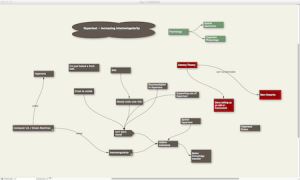Archive for the ‘hypertext’ tag
Improving Intertwingularity no comments
In the 1987 revision of his book Computer Lib [1], Ted Nelson wrote:
EVERYTHING IS DEEPLY INTERTWINGLED. In an important sense there are no “subjects” at all; there is only all knowledge, since the cross-connections among the myriad topics of this world simply cannot be divided up neatly. Hierarchical and sequential structures, especially popular since Gutenberg, are usually forced and artificial. Intertwingularity is not generally acknowledged—people keep pretending they can make things hierarchical, categorizable and sequential when they can’t.
I’m not sure the Web has yet caught up with Nelson’s vision of Project Xanadu, or the degree to which it is practical to do so. But, he makes a good point about the weakness of relying too much on hierarchy. Hypertext makes possible a wonderfully interconnected Web which has been a daily source of improvement and enjoyment. However, much of it feels like moving around a big box-and-line diagram, merely mapping nodes and links. Frequently, web usage is continuous a loop in and out of search tools (like Google) between individual or small clusters of pages, rather than following richly linked data strands.
Richer linking is less common. Although many links may be present in a document many are simply in-page/site navigation links or SEO-aiding faux page breaks. Also, the paucity and sterility of links may reflect the economic approach of finding and trapping eyeballs – why send people to your competitors, by linking to them? Links to, or through, paywalls are also of suspect value. Meanwhile, given the node-and-link model, we tend to envision the web as hierarchy – or a directed graph at least. A less intertwingled reality, it seems.
My experience from writing documentation and software community support has shown it surprisingly hard to achieve sticky knowledge transfer except when working at or close to one-to-one scope; not very efficient. The lazy reaction is to blame the learners, but I’m open to the thought that as authors of hypertext, maybe we’re not doing this right. Perhaps we need to use a different tack and be less shallow in our weaving of the Web, offering the reader more routes to their goal of knowledge. More intertwingularity, applied with some thought, might move us forward. Approaches like spatial hypertext and techniques from hypertext fiction may help, even if currently egregious compared to standard practice.
Figure: Early stage planning in Tinderbox
Serendipity strikes, as now I’m being asked to look at a Web issue through the eyes of two different disciplines. Those I’ve selected as showing promise in providing a useful alternative view to the above, are:
- Psychology. This studies the human mind and behaviour, seeking to explain how we feel, act and reason. The intuited relevance to my topic is that a better understanding of our reasoning – and motivation for behaviour – might allow us to make smarter choices about how we author hypertext, to meet and reward those motivations.
- Literary Theory. This discipline seeks to describe the methods and ideas we use in the – reading and understanding of literature. A set of tools, if you will, by which we may understand literature. It will be interesting to see how the non-linearity of Hypertext fiction fits current theory.
I’m unsure as yet how narrow we may set our disciplinary scope here as, within the above, Cognitive Psychology and Narrative seem sensible sub-topics. Within the Literary Theory and indeed Narrative, culturally-based sub-sets with doubtless exist: does one size fit all? However, my plan is to start wide and winnow to find an appropriate breadth of coverage.
Starting Texts
Thus far my research has been a reconnaissance, more browsing than structural study, to help me pick some starting research references. So, these are my selections for initial study at least in terms of published books. Disclosure – I’ve not yet read these, rather they are what I plan to start reading:
- Psychology / G. Neil Martin, Neil R. Carlson, William Buskist.
- Cognitive psychology : a student’s handbook / Michael W. Eysenck, Mark T. Keane.
- Literary theory : a very short introduction / Jonathan Culler
- Literary theory : an introduction / Terry Eagleton
Footnotes:
- [1] Nelson, Theodor (1987), Computer Lib/Dream Machines (Rev. ed.), Redmond, WA: Tempus Books of Microsoft Press, ISBN 0-914845-49-7
Cognitive Extension, part 3 no comments
It is (slowly) dawning on me as I look at some of the earlier hypertext systems, that some of them were, in some ways, all about cognitive extension. And when I say “earlier”, I mean those that have been tried out in the past, already. Namely, Memex and NoteCard. What I don’t mean is that NoteCard is an earlier version of the Web. If anything, it seems to be a second generation hypermedia system, while the Web (I’m starting to think) is a first generation system.
I’m thinking the Memex, for example, which was to support and supplement one’s memory, is a cognitive extension just as the notebook of the person with Alzheimer’s during his visit to the Museum (those who understand that reference, know what I’m talking about).
Similarly, the NoteCard computer environment wasn’t built to replace the intellectual creative process, but to support it. To help make sense of ideas, manage and present them.
So is the Web a tool a cognitive extension?
